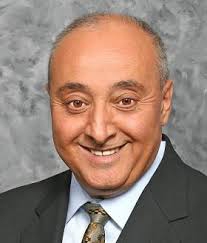
Ismael Ahmed
Ismael Ahmed, made his dreams come true, against the odds.
"My dad was a peddler. My stepfather was a factory worker, an auto worker, as was my grandfather. I come from a very working-class background."
His saving grace was his grandmother and mentor, Aliya Hassen. "She was a feminist in the 1950s, and a close friend of Malcolm X," he says. But that's an understatement. She was an Arab-American community leader in the Dearborn-Detroit area, and her papers, including her correspondence with Malcolm X, are housed in the Bentley Historical Library.
From age six until a teen, Ismael lived in an immigrant neighborhood in Dearborn. He saw the strife and struggle around him and realized he wanted to make a change. Though he wanted to make a difference, he needed to make enough money to send himself to college. "I worked on overseas freighters, in auto plants for 12 years, on and off, on the line. I went to school in between. I actually didn't finish school until I was about 30."
Activist Passions
Before he graduated from UM-Dearborn with his degree in secondary education, his mission in life was firm. "I was on the U-M campus and wanted to do things in the neighborhood that I came from, for low-income immigrants of all kinds. I wanted to organize a center to help."
So, in 1973, with the help of his already-connected grandmother, he and others organized ACCESS, the Arab Community Center for Economic and Social Services, in a little south-side Dearborn storefront. Hassen was its first director, and helped her grandson organize English classes and arrange for new immigrants of Arab descent to get food and housing. Ismael spent 38 years with ACCESS. He followed in the footsteps of his grandmother, becoming director and remaining there for 24 years. ACCESS has grown to become the largest Arab-American organization in the U.S. "We're now in twelve states and 22 cities," he says. But he could not stop there. This was just the beginning of his mission.
In August 2007, then-Governor Jennifer Granholm appointed Ahmed head of Michigan's Department of Human Services, the state's second largest agency.
"Ismael Ahmed led the Department of Human Services during some of the toughest economic times in Michigan history when demand for assistance skyrocketed," said Granholm. "He focused on eradicating poverty, implemented training to get challenged citizens into the workforce, helped create an online assistance system and oversaw the biggest reforms ever in child welfare."
"It was a good time, too," says Ahmed.
A Highly Engaged Campus
When his term as HDS Director ended in January 2011, Ismael was invited back to UM-Dearborn, and is currently associate provost for metropolitan impact. He says returning to his alma mater was a "no-brainer."
Ahmed and UM-Dearborn are launching (in November 2013) a new "Public Allies" program, an AmeriCorps program that "places young people from 18 to 35 years old in community non-profits and government, to grow their capacity to impact metropolitan problems. They are also building student housing to encourage more students to live on campus (rather than commute) so they are more an integral part of the community. "The most important thing is these (students) are the people who will stay in metro Detroit and be the leaders in the practical sense."
"We are highly engaged in the metropolitan Detroit area and surroundings," Ismael says. "We have thousands of students now who are working in prisons, agencies, government, community organizations, to impact the kind of problems that people face."
Ismael believes that central to everything, are every day working people. Those are the people he says that "you want to rely on, work with, to make change, and make life better."
Ismael is a happy man. He has been married for over 30 years to Margaret King Ahmed, a teacher in the Dearborn School District, who is a leader in her own right, working currently to improve the district's failing schools. They have five children (two girls and three boys) and five grandchildren.
"UM-Dearborn has been really important in my life," he says. "It's been transformational. I've been there since January 2011. In ten years? I hope to be wherever I can do the most good.
"Right now, that's here."
- Jan Schlain